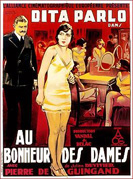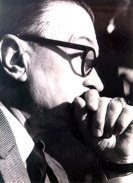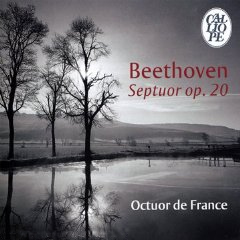Au Bonheur des Dames

- Production : France, 1929
- Length : 85 min at 24 frames/second
- Orchestration : 1st violin, 2nd violin, Viola, Cello, Double Bass, Clarinet, Bassoon, French Horn, Piano, Percussion, Soprano
Scenario :
Orphaned, Denise Baudu goes to live in Paris with her uncle, owner of a drapery store : « Au vieil Elbeuf », which is nearly bankrupt because of the competition from the nearby modern department store : « Au Bonheur des Dames ». Ironically, the young girl from the provinces finds a job in the department store where she catches the eye of the owner, Octave Mouret. In spite of her efforts to the contrary, she becomes involved in the intrigues of the store and is courted by the fickle Mouret. Denise goes back to her ruined uncle whose daughter, Geneviève, is dying of exhaustion, abandoned by her fiancé.
Maddened by despair, old man Baudu crosses the street and climbs the main staircase of « Au Bonheur des Dames » to shoot his rival. He misses, leaves the store in a daze and is run over by a delivery cart. Denise finds Mouret who sincerely loves her, even to the point of having put his job at risk. (Source : Vision du film)
The Director :
Julien Duvivier
 Born in Lille in 1896, Julien Duvivier was a stage actor and then production assistant on André Antoine’s films before starting as a director in 1919. His prolific career – over 60 films – only ended on his death in 1967. After twenty or so silent movies inspired from many different sources, he attained international recognition in the 1930’s with movies which have become classics of “poetic realism”, notably the sound remake of Poil de carotte (1932), La Belle équipe (1936) and Pépé le Moko (1937).
Born in Lille in 1896, Julien Duvivier was a stage actor and then production assistant on André Antoine’s films before starting as a director in 1919. His prolific career – over 60 films – only ended on his death in 1967. After twenty or so silent movies inspired from many different sources, he attained international recognition in the 1930’s with movies which have become classics of “poetic realism”, notably the sound remake of Poil de carotte (1932), La Belle équipe (1936) and Pépé le Moko (1937).
After exile in Hollywood during the war, he returned to France in 1946 but failed to regain his former critical standing, despite such remarkable films as Panique (1947), Voici le temps des assassins (1956) and Pot Bouille (1957). He enjoyed international succes with The Little World of Don Camillo (1951).
The Composer :
Gabriel Thibaudeau
 Born in 1959 in Beauharnois, Quebec, Gabriel Thibaudeau studied piano at the Vincent d’Indy Music School and composition at the Music Faculty of Montreal University. He also participated in summer schools at the Orford Arts Center where he worked on composition with Iannis Xenakis.
Born in 1959 in Beauharnois, Quebec, Gabriel Thibaudeau studied piano at the Vincent d’Indy Music School and composition at the Music Faculty of Montreal University. He also participated in summer schools at the Orford Arts Center where he worked on composition with Iannis Xenakis.
As permanent pianist at the Quebec Film Library since 1988, and recognised as the Canadian specialist in the accompanying of silent movies, he has been invited since 1991 to the Gionarte del Cinema Muto, in Pordenone and since 1992 to the festival Il Cinema Ritrovato, in Bologna, Italy.
Since 1993, among other works for the silent cinema, he has composed a quintet for brass and percussion for the film Straight Shooting, a concerto for piano and chamber orchestra for the film The Fall of the House of Usher, a sextet for the film Foolish Wives, and a Requiem for soprano and piano for the film The Hunchback of Notre-Dame. In association with the Octuor de France he has composed the music to accompany The Man who Laughs, Au Bonheur des Dames, The Iron Mask and Poil de Carotte, as well as adapting for the Octuor de France his orchestral score for The Phantom of the Opera.
 English
English Français
Français











